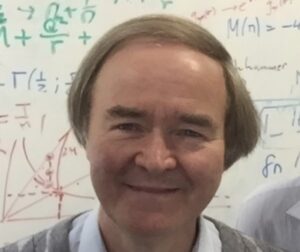Your cart is currently empty!

Is the Multiverse in the Mind or is the Mind in the Multiverse?
- This event has passed.
October 23, 2021 @ 6:00 pm – 8:00 pm CEST

Watch the recording
Is the Multiverse in the Mind or is the Mind in the Multiverse?
with Bernard Carr
Saturday October 23, 2021
9:00 PDT | 12:00 EDT | 17:00 BST | 18:00 CEST
2-hour session
If you are unable to attend the live session, the recording will be available.
Physics has been triumphant in understanding the vast array of structures in the universe and the forces which link the microscopic and macroscopic domains. This link culminates in the big bang, where the very small (M-theory) meets the very large (the multiverse). The history of physics might also be regarded as the expansion of our consciousness to ever larger and smaller scales. However, at each stage the micro and macro frontiers have been regarded as bordering on philosophy because of the lack of empirical data. So does the merging of the two physics/philosophy borders at the big bang indicate the end of physics or the need for a radically new paradigm. I take the latter view and argue that a feature of the next paradigm must be an expansion of physics to accommodate mind and consciousness. This proposal impinges on two problems on the borders of physics and philosophy: the relationship between physical space and perceptual space and the nature of the passage of time. It is argued that the resolution of both these problems may involve a 5-dimensional model, with the 5th dimension being associated with mental time. This proposal may relate to recent developments in brane cosmology, which is one version if the multiverse proposal. A description of consciousness must also entail a proper understanding of the specious present, the minimum timescale of conscious experience, and this may be associated with other dimensions which arise in M-theory. Higher dimensions may therefore play a vital role in linking physics, the multiverse and mind.
To see the Full Multiple Universes Program

Bernard Carr is Emeritus Professor of Mathematics and Astronomy at Queen Mary University of London. His professional area of research is cosmology and astrophysics and includes such topics as the early universe, dark matter, black holes and the anthropic principle. For his PhD he studied the first second of the Universe, working under the supervision of Stephen Hawking at the Institute of Astronomy in Cambridge and the California Institute of Technology.He was elected to a Fellowship at Trinity College, Cambridge, in 1975 and moved to Queen Mary College in 1985. He has also held Visiting Professorships at Kyoto University, Tokyo University, the Fermi National Accelerator Laboratory and the Canadian Institute for Theoretical Astrophysics. He is the author of nearly three hundred scientific papers and the books Universe or Multiverse? and Quantum Black Holes. Beyond his professional field, he is interested in the role of consciousness in physics and in an expanded paradigm which accommodates mind. He also has a long-standing interest in the relationship between science and religion. He was President of the Society for Psychical Research in 2000-2004 and is currently President of the Scientific and Medical Network.
